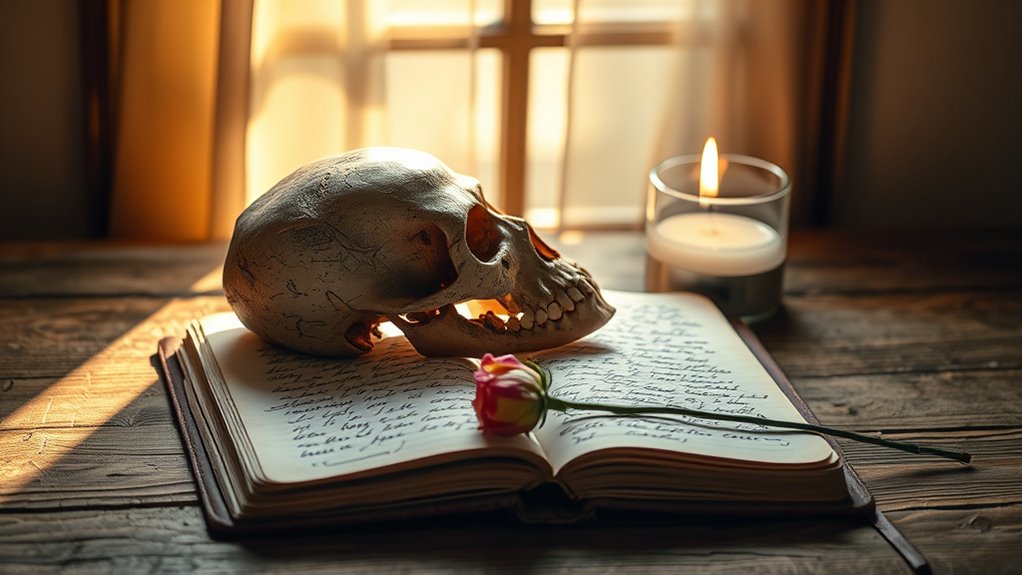By remembering that life is finite, you gain clarity and gratitude, helping you focus on what truly matters. Reflecting on mortality encourages you to live intentionally, make meaningful choices, and prioritize your passions and relationships. Using symbols or daily affirmations keeps this awareness fresh, reducing fear and fostering authenticity. Embracing this perspective empowers you to live with purpose and resilience. If you want to explore practical ways to incorporate this mindset into your life, there’s more to discover ahead.
Key Takeaways
- Reflecting on mortality encourages living with purpose and prioritizing meaningful relationships and passions.
- Regular reminder of death fosters gratitude and helps reduce fear, promoting emotional resilience.
- Incorporating visual or mental cues of mortality keeps awareness present, inspiring mindful and intentional daily actions.
- Embracing impermanence cultivates authenticity, helping you make decisions aligned with your core values.
- Contemplating mortality shifts perspective, enabling you to focus on what truly matters and live more fully.
The Origins and Meaning of Memento Mori

Memento Mori, a Latin phrase meaning “remember that you will die,” has its roots in ancient Roman and Christian traditions that emphasize the inevitability of death. During the medieval period, symbolism played a pivotal role, with skulls, hourglasses, and wilting flowers serving as reminders of mortality. These symbols encapsulate deep philosophical implications, urging you to reflect on life’s transient nature. Medieval symbolism often appeared in art, literature, and religious practices, encouraging humility and spiritual focus. By confronting symbols of death, you’re prompted to re-evaluate your priorities and embrace a life of purpose. Understanding the symbolism of mortality can deepen your appreciation for each moment you have. Recognizing the transience of life encourages a mindset that values meaningful experiences over material pursuits. Additionally, contemplating mortality can foster a sense of spiritual growth and personal development, guiding you toward a more authentic existence. Exploring the cultural history of memento mori reveals how different societies have used mortality symbols to shape moral and spiritual values. This awareness of mortality symbolism can also serve as a catalyst for living intentionally and fostering resilience in the face of life’s challenges. Ultimately, the origins of Memento Mori reveal a timeless call to acknowledge mortality, inspiring a more meaningful existence rooted in the awareness of life’s fleeting nature.
How Reflecting on Mortality Shapes Your Perspective

When you regularly reflect on mortality, it can profoundly shift how you perceive your life and choices. Cultural attitudes toward death vary widely, influencing whether you see mortality as a taboo or an opportunity for growth. Philosophical perspectives, from Stoicism to existentialism, emphasize that acknowledging death helps you prioritize what truly matters. Recognizing life’s fragility encourages you to focus on meaningful relationships, passions, and personal values. It challenges you to confront fears and reconsider priorities, fostering a sense of urgency and clarity. By contemplating mortality, you gain perspective, understanding that life’s impermanence makes every moment precious. This awareness can inspire you to live more authentically, aligning your actions with your deepest convictions rather than superficial pursuits. Incorporating mindfulness practices can further support this reflective process by promoting mental clarity and emotional balance.
Practical Ways to Incorporate Memento Mori Into Daily Life

Incorporating memento mori into your daily routine can be a powerful way to keep mortality at the forefront of your mind, encouraging more intentional living. To do this, try these practical methods:
- Start each day with daily affirmations that remind you of life’s fleeting nature.
- Keep a mindful journaling practice, reflecting on your mortality and what truly matters.
- Place visual cues, like a skull or candle, in your workspace or home as a constant reminder.
- Pause regularly to take deep breaths, contemplating your impermanence and the importance of present moments.
These habits help reinforce your awareness of mortality, inspiring you to prioritize meaningful activities and foster gratitude every day.
Overcoming Fear and Denial of Mortality

Facing the reality of mortality can evoke deep-seated fear and denial, but acknowledging these emotions is a crucial step toward acceptance. Cultural taboos often reinforce this avoidance, making it harder to confront death openly. To overcome this, you need emotional resilience—training yourself to face uncomfortable truths with courage. Recognize that fear stems from the unknown and a sense of loss; understanding this can reduce its power. Start by reflecting on mortality regularly, not to frighten yourself, but to desensitize the emotional charge. Incorporating Well-Being Tips awareness into your reflection can deepen your understanding of life’s transient nature and the importance of living fully. Overcoming these barriers empowers you to live more intentionally, free from the paralyzing grip of fear, and opens the door to genuine acceptance of life’s impermanence.
Living With Intention: Turning Awareness Into Action

Once you’ve acknowledged your mortality, the next step is to translate that awareness into meaningful actions. This involves cultivating mindful habits that align with your core values and adopting a purpose-driven living approach. To make this shift, consider:
- Setting clear, intentional goals that reflect what truly matters.
- Practicing daily reflections to stay connected with your purpose.
- Prioritizing activities that bring fulfillment over distractions.
- Embracing change as an opportunity to grow and live authentically.
- Incorporating virtue and intention into daily decisions to foster resilience and inner peace. Developing a mindset that leverages AI-driven personalization can help tailor your goals and habits to better suit your evolving needs, while mindful practices like visualization techniques can deepen your sense of purpose. Additionally, understanding wax types and their properties can inspire you to create personalized candles that symbolize your journey and intentions. Recognizing relationship dynamics can also help you nurture healthier connections and live more intentionally.
Frequently Asked Questions
Can Memento Mori Practices Help Reduce Anxiety About Death?
You might find that practicing memento mori helps reduce anxiety about death by shifting your focus from fear to acceptance. By consciously contemplating mortality, you engage in effective fear reduction and anxiety management strategies. This awareness encourages you to live more mindfully, appreciating each moment. As a result, you gain a healthier perspective on life and death, easing fears and promoting emotional resilience in facing life’s inevitable end.
How Do Different Cultures Interpret and Use Memento Mori?
Different cultures interpret and use memento mori through unique spiritual symbolism and cultural rituals. You’ll find that in some societies, skulls and bones symbolize life’s impermanence, while others incorporate specific ceremonies to honor ancestors. These practices remind you to embrace mortality, fostering humility and reflection. By understanding these diverse perspectives, you gain insight into how cultural rituals shape attitudes toward death, encouraging a more mindful, appreciative approach to life.
Is It Possible to Balance Awareness of Mortality With Daily Happiness?
Did you know that people who practice mindful appreciation report greater happiness? Balancing awareness of mortality with daily joy is possible. You can focus on life prioritization, appreciating each moment without fear. Remembering death helps you stay present, encouraging gratitude and meaningful choices. By embracing this awareness, you find a richer, more fulfilling life, where happiness and mortality coexist, guiding you to live intentionally every day.
What Are Common Misconceptions About Memento Mori?
Many believe memento mori is just about dwelling on death, but myth debunking shows it’s actually about embracing life fully. Its historical origins date back to ancient Rome and the Renaissance, serving as a reminder to prioritize what truly matters. You might think it’s depressing, but in reality, it encourages you to live intentionally, fostering gratitude and mindfulness instead of fear.
How Does Aging Influence One’S Engagement With Memento Mori?
Aging influences your engagement with memento mori by deepening your aging perspective, prompting more meaningful life reflection. As you grow older, you naturally become more aware of mortality, which encourages you to focus on what truly matters. This awareness helps you live intentionally, appreciating each moment. Embracing memento mori becomes easier, as aging reminds you that life’s finite, motivating you to prioritize what brings genuine fulfillment.
Conclusion
By embracing memento mori, you transform life’s fleeting moments into precious opportunities, like a gardener tending to delicate blooms before they fade. When you reflect on mortality, you gain clarity and purpose, making each day count. Don’t let fear or denial hold you back—use this awareness to live intentionally and authentically. Remember, just as night gives way to dawn, acknowledging death can illuminate the path to a more meaningful life.









